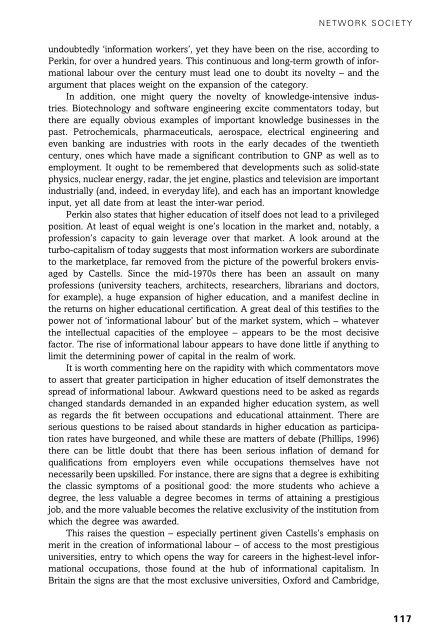Theories of the Information Society, Third Edition - Cryptome
Theories of the Information Society, Third Edition - Cryptome
Theories of the Information Society, Third Edition - Cryptome
You also want an ePaper? Increase the reach of your titles
YUMPU automatically turns print PDFs into web optimized ePapers that Google loves.
NETWORK SOCIETY<br />
1<br />
1<br />
1<br />
2<br />
1<br />
1<br />
undoubtedly ‘information workers’, yet <strong>the</strong>y have been on <strong>the</strong> rise, according to<br />
Perkin, for over a hundred years. This continuous and long-term growth <strong>of</strong> informational<br />
labour over <strong>the</strong> century must lead one to doubt its novelty – and <strong>the</strong><br />
argument that places weight on <strong>the</strong> expansion <strong>of</strong> <strong>the</strong> category.<br />
In addition, one might query <strong>the</strong> novelty <strong>of</strong> knowledge-intensive industries.<br />
Biotechnology and s<strong>of</strong>tware engineering excite commentators today, but<br />
<strong>the</strong>re are equally obvious examples <strong>of</strong> important knowledge businesses in <strong>the</strong><br />
past. Petrochemicals, pharmaceuticals, aerospace, electrical engineering and<br />
even banking are industries with roots in <strong>the</strong> early decades <strong>of</strong> <strong>the</strong> twentieth<br />
century, ones which have made a significant contribution to GNP as well as to<br />
employment. It ought to be remembered that developments such as solid-state<br />
physics, nuclear energy, radar, <strong>the</strong> jet engine, plastics and television are important<br />
industrially (and, indeed, in everyday life), and each has an important knowledge<br />
input, yet all date from at least <strong>the</strong> inter-war period.<br />
Perkin also states that higher education <strong>of</strong> itself does not lead to a privileged<br />
position. At least <strong>of</strong> equal weight is one’s location in <strong>the</strong> market and, notably, a<br />
pr<strong>of</strong>ession’s capacity to gain leverage over that market. A look around at <strong>the</strong><br />
turbo-capitalism <strong>of</strong> today suggests that most information workers are subordinate<br />
to <strong>the</strong> marketplace, far removed from <strong>the</strong> picture <strong>of</strong> <strong>the</strong> powerful brokers envisaged<br />
by Castells. Since <strong>the</strong> mid-1970s <strong>the</strong>re has been an assault on many<br />
pr<strong>of</strong>essions (university teachers, architects, researchers, librarians and doctors,<br />
for example), a huge expansion <strong>of</strong> higher education, and a manifest decline in<br />
<strong>the</strong> returns on higher educational certification. A great deal <strong>of</strong> this testifies to <strong>the</strong><br />
power not <strong>of</strong> ‘informational labour’ but <strong>of</strong> <strong>the</strong> market system, which – whatever<br />
<strong>the</strong> intellectual capacities <strong>of</strong> <strong>the</strong> employee – appears to be <strong>the</strong> most decisive<br />
factor. The rise <strong>of</strong> informational labour appears to have done little if anything to<br />
limit <strong>the</strong> determining power <strong>of</strong> capital in <strong>the</strong> realm <strong>of</strong> work.<br />
It is worth commenting here on <strong>the</strong> rapidity with which commentators move<br />
to assert that greater participation in higher education <strong>of</strong> itself demonstrates <strong>the</strong><br />
spread <strong>of</strong> informational labour. Awkward questions need to be asked as regards<br />
changed standards demanded in an expanded higher education system, as well<br />
as regards <strong>the</strong> fit between occupations and educational attainment. There are<br />
serious questions to be raised about standards in higher education as participation<br />
rates have burgeoned, and while <strong>the</strong>se are matters <strong>of</strong> debate (Phillips, 1996)<br />
<strong>the</strong>re can be little doubt that <strong>the</strong>re has been serious inflation <strong>of</strong> demand for<br />
qualifications from employers even while occupations <strong>the</strong>mselves have not<br />
necessarily been upskilled. For instance, <strong>the</strong>re are signs that a degree is exhibiting<br />
<strong>the</strong> classic symptoms <strong>of</strong> a positional good: <strong>the</strong> more students who achieve a<br />
degree, <strong>the</strong> less valuable a degree becomes in terms <strong>of</strong> attaining a prestigious<br />
job, and <strong>the</strong> more valuable becomes <strong>the</strong> relative exclusivity <strong>of</strong> <strong>the</strong> institution from<br />
which <strong>the</strong> degree was awarded.<br />
This raises <strong>the</strong> question – especially pertinent given Castells’s emphasis on<br />
merit in <strong>the</strong> creation <strong>of</strong> informational labour – <strong>of</strong> access to <strong>the</strong> most prestigious<br />
universities, entry to which opens <strong>the</strong> way for careers in <strong>the</strong> highest-level informational<br />
occupations, those found at <strong>the</strong> hub <strong>of</strong> informational capitalism. In<br />
Britain <strong>the</strong> signs are that <strong>the</strong> most exclusive universities, Oxford and Cambridge,<br />
117
















